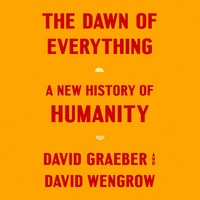Take a photo of a barcode or cover
informative
inspiring
reflective
slow-paced
challenging
informative
inspiring
reflective
slow-paced
challenging
hopeful
informative
inspiring
reflective
slow-paced
informative
slow-paced
challenging
informative
slow-paced
challenging
informative
slow-paced
I think that this book largely does what it says it's going to do, which is to critique others who present expansive histories, and to re-envision the way in which we think about the evolution of society. First though, I think some of the main criticisms of this book should be addressed.
As I read through some of the reviews for this book, the main criticisms from detractors seem to be that: 1) the Davids are spitballing with very little evidence, 2) that most of their evidence is not supported by the majority of the anthropological community, and 3) that this book is overtly political.
Firstly, anyone who thinks that this book has a lack of evidence has literacy problems. Each paragraph has several citations pertaining to both anthropological and archeological evidence--There are so many footnotes that the notes section at the end of this book is over 150 pages long. Secondly, the authors are hyperaware that most of the evidence that they are presenting has been either overlooked or panned by much of the anthropological community. They spend a lot of time in the book explaining that the reasons for specific ethnographic evidence being overlooked usually have to do with structural sexism or racism. And most of their evidence is, indeed, ethnographic or archeological--If you're looking for copious numerical data, then you're misunderstanding what an ethnography actually is, and therefore what most of the anthropological field is based on. Thirdly, this book is meant to be political, and if you're uncomfortable with that, maybe you need to re-examine your politics. Everything is political, including academic work, no matter how many stuffy professors try to convince you that they're the most impartial font of knowledge on the planet.
David Graeber's life's work was devoted to decolonizing anthropology and our supposedly commonsense ideas about the world. So, it's no surprise that I can literally envision him reading "Sapiens" by Yuval Noah Harari and having a hissy fit, saying "I could do that better and I will." Largely, he and his co-author did accomplish what they set out to do. Primarily, they claim that we have been asking the wrong questions about inequality and the progressions of society all along, and that it has led to the pervasive assumption that society always follows a linear trajectory from hunter gatherers, to agricultural communities, to cities, and finally to our modern conception of the nation-state.
As it turns out, this kind of thinking is contradicted by a significant amount of objective archeological and subjective anthropological evidence. The Davids point out that there are several cultures that regularly shift from being mobile hunting bands in one season to being sedentary villagers in the next. They also point out that several societies seem to explicitly reject farming or city life after having experimented with both forms of living for various periods of time. Through examining various case studies, they explain that cultures can be very close to one another geographically while still being radically different in terms of the particular social mores that they choose to emphasize. In this way, the questions about inequality in society largely have to be examined by evaluating which ethical decisions that particular cultures place value upon, and not by an objective metric like how much money someone has. Not only is there no society in which people are "equal" in every way, but very often, the things that people *reject* as immoral give us clues as to how their society developed in the first place.
Of course, I do also have some critiques of this book, which is why I can't give it 5 stars. This study is meant to be an expansive one, and there is so much evidence presented at times that it can be hard to wade through. There was a section about the archeology of cereal grain farming that I found to be particularly boring, but it was necessary to demonstrate a point that was made later in the book. Even so, I think some of the supporting evidence in this study could have been pared down significantly, and it would have been just as good. I also feel that the book could have been organized differently--The authors have the somewhat annoying habit of posing major thematic questions in the beginning and middle of the book ("How did we get stuck with our current social system?") only to answer them succinctly hundreds of pages later. In my opinion, they could have posed one question, presented the evidence, and then answered the question, instead of stringing readers along by holding a carrot in front of their faces. That particular strategy for writing a book is a little gimmicky, in my opinion.
In any case, you really can tell that this study was a labor of love, and indeed, it was the product of over a decade of research. It is also a fitting last book for David Graeber, who unfortunately passed away in 2020, just prior to the book's publication. He will be sorely missed, and I hope that some of his writing can be published posthumously so that we don't have to say goodbye just yet.
As I read through some of the reviews for this book, the main criticisms from detractors seem to be that: 1) the Davids are spitballing with very little evidence, 2) that most of their evidence is not supported by the majority of the anthropological community, and 3) that this book is overtly political.
Firstly, anyone who thinks that this book has a lack of evidence has literacy problems. Each paragraph has several citations pertaining to both anthropological and archeological evidence--There are so many footnotes that the notes section at the end of this book is over 150 pages long. Secondly, the authors are hyperaware that most of the evidence that they are presenting has been either overlooked or panned by much of the anthropological community. They spend a lot of time in the book explaining that the reasons for specific ethnographic evidence being overlooked usually have to do with structural sexism or racism. And most of their evidence is, indeed, ethnographic or archeological--If you're looking for copious numerical data, then you're misunderstanding what an ethnography actually is, and therefore what most of the anthropological field is based on. Thirdly, this book is meant to be political, and if you're uncomfortable with that, maybe you need to re-examine your politics. Everything is political, including academic work, no matter how many stuffy professors try to convince you that they're the most impartial font of knowledge on the planet.
David Graeber's life's work was devoted to decolonizing anthropology and our supposedly commonsense ideas about the world. So, it's no surprise that I can literally envision him reading "Sapiens" by Yuval Noah Harari and having a hissy fit, saying "I could do that better and I will." Largely, he and his co-author did accomplish what they set out to do. Primarily, they claim that we have been asking the wrong questions about inequality and the progressions of society all along, and that it has led to the pervasive assumption that society always follows a linear trajectory from hunter gatherers, to agricultural communities, to cities, and finally to our modern conception of the nation-state.
As it turns out, this kind of thinking is contradicted by a significant amount of objective archeological and subjective anthropological evidence. The Davids point out that there are several cultures that regularly shift from being mobile hunting bands in one season to being sedentary villagers in the next. They also point out that several societies seem to explicitly reject farming or city life after having experimented with both forms of living for various periods of time. Through examining various case studies, they explain that cultures can be very close to one another geographically while still being radically different in terms of the particular social mores that they choose to emphasize. In this way, the questions about inequality in society largely have to be examined by evaluating which ethical decisions that particular cultures place value upon, and not by an objective metric like how much money someone has. Not only is there no society in which people are "equal" in every way, but very often, the things that people *reject* as immoral give us clues as to how their society developed in the first place.
Of course, I do also have some critiques of this book, which is why I can't give it 5 stars. This study is meant to be an expansive one, and there is so much evidence presented at times that it can be hard to wade through. There was a section about the archeology of cereal grain farming that I found to be particularly boring, but it was necessary to demonstrate a point that was made later in the book. Even so, I think some of the supporting evidence in this study could have been pared down significantly, and it would have been just as good. I also feel that the book could have been organized differently--The authors have the somewhat annoying habit of posing major thematic questions in the beginning and middle of the book ("How did we get stuck with our current social system?") only to answer them succinctly hundreds of pages later. In my opinion, they could have posed one question, presented the evidence, and then answered the question, instead of stringing readers along by holding a carrot in front of their faces. That particular strategy for writing a book is a little gimmicky, in my opinion.
In any case, you really can tell that this study was a labor of love, and indeed, it was the product of over a decade of research. It is also a fitting last book for David Graeber, who unfortunately passed away in 2020, just prior to the book's publication. He will be sorely missed, and I hope that some of his writing can be published posthumously so that we don't have to say goodbye just yet.
challenging
hopeful
informative
inspiring
reflective
medium-paced
informative
inspiring
medium-paced
challenging
hopeful
informative
reflective
I listened to the audio book.
Entertaining, insightful and inspiring! Really interesting alternative view on the history of humanity and develooment of civilization.
Entertaining, insightful and inspiring! Really interesting alternative view on the history of humanity and develooment of civilization.







